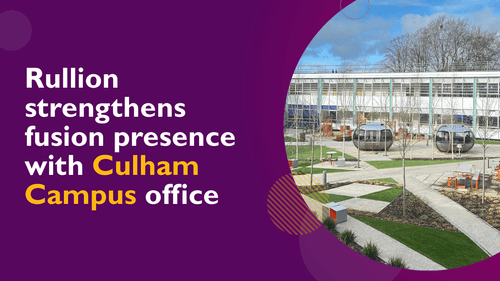Rethinking Nuclear Waste: Liz Muller’s Mission to Revolutionise the Industry
In episode three of Hot off the Grid, our video interview series spotlighting the people shaping the future of the UK nuclear industry, Sibel Akel, Marketing Director at Rullion, speaks with Liz Muller, CEO and co-founder of Deep Fission.
Liz’s entry into nuclear wasn’t through the usual route. She didn’t come from a nuclear engineering background or start her career in a traditional utility. Instead, she was driven by a deeply personal and persistent question: where does nuclear waste go?
“It was one of those questions I grew up with,” Liz recalls. “My father was in the nuclear industry. People like Luis Alvarez were family friends. The conversation around nuclear was just... part of my world.”
This question sparked an idea that became a mission. Today, Liz leads Deep Fission, a startup developing deep borehole disposal technology that could drastically reduce timelines, lower costs, and fundamentally reshape how the world manages nuclear waste.
Where Does Nuclear Waste Go?
Growing up surrounded by scientists and Nobel Prize-winning thinkers gave Liz early exposure to the big questions that would eventually define her career.
“The science around nuclear energy is incredible,” she says. “But the waste issue has always cast a shadow. If we don’t solve that, public resistance will remain, and so will project delays.”
Despite this interest, Liz initially chose a different route where she studied environmental policy and working in consultancy. But the waste question never left her.
Turning a Problem Into a Purpose
In time, Liz reconnected with her father, a physicist and serial innovator. Together, they began exploring new methods to solve the nuclear waste conundrum. Their solution? Leverage directional drilling (proven in the oil and gas industry), to place nuclear waste deep underground in corrosion-resistant canisters.
“The models the industry has been using haven’t really changed since the 1970s. People said nuclear was too slow to evolve, too entrenched. That just made me more determined to show that change is possible,” Liz explains.
That determination led to the creation of Deep Isolation and, later, Deep Fission. These companies aim to solve nuclear waste management through horizontal boreholes drilled more than a mile underground - a method that could be significantly cheaper, faster, and safer than building massive geological repositories.
“It’s transformative,” Liz says. “We’re talking about disposal that can happen in weeks, not decades.”
Deep Fission’s technology is already gaining attention and could be commercially operational by 2029. Their work is helping shift the global narrative around what’s possible in nuclear waste disposal.
A New Problem to Solve: Cost
As public sentiment and political support for nuclear improves, driven by climate goals and energy security. The demand for clean, reliable power is growing fast.
“Nuclear isn’t just about replacing coal or gas anymore,” Liz notes. “It’s becoming critical for powering AI, data centres, and the electricity demands of a digitised future.”
Despite that, the industry still faces a major hurdle: affordability.
“There’s been a lot of progress in reactor design, modular construction, and safety systems,” she says. “But cost (after waste) is the biggest challenge. We haven’t had the real breakthrough in economics yet. That’s where Deep Fission comes in.”
The company is also exploring advanced systems like thorium reactors and high-temperature gas reactors that could one day be deployed inside boreholes themselves, eliminating even more surface footprint and infrastructure.
“We’re not just building technology,” Liz says. “It feels like we’re building an ecosystem.”
Case Study: Applying Innovation in Practice
Deep Fission recently partnered with a European government to conduct a feasibility study on borehole disposal for legacy nuclear waste. The study involved assessing regional geology, conducting public engagement workshops, and designing a pilot borehole.
The results? The project timeline was cut from an estimated 15 years to under five. Community support grew after education sessions clarified how the process worked and how safety would be ensured. A full-scale trial is now scheduled for early 2026.
This case highlights the real-world viability of Liz’s approach, and its potential to transform nuclear waste management globally.
Creating Careers and Welcoming Talent
As the nuclear sector transforms, it needs new people to help shape its future. That’s where nuclear energy careers are evolving - into exciting opportunities for engineers, policymakers, data scientists, and even those outside traditional STEM fields.
“There’s so much talent out there,” Liz says. “We’re not just hiring in the US. We’re hiring across the world. The UK nuclear industry has so much potential, especially for women in nuclear and younger generations.”
Her advice to those exploring jobs in nuclear or clean energy jobs in the UK?
“Find your people. Attend events. Talk to others working on the same challenges. That network is everything.”
“And find mentors. The nuclear industry is one of the most welcoming industries I’ve been part of.”
On Mentors and Mindsets
When asked who’s inspired her most, Liz doesn’t hesitate.
“Definitely my dad,” she says. “He has the kind of mindset where he enters every new challenge with a beginner’s mind. That’s vital for startups, because in six months, everything about the company can change.”
She also credits her mother, an architect and small business owner, for showing her how to fully commit to both professional and personal ambitions.
“She taught me the value of going all in. If you’re going to do something, give it your whole heart.”
The Future of Nuclear is Personal
Liz Muller proves you don’t need a conventional background to make a lasting impact in nuclear. What you need is curiosity, resilience, and a willingness to ask bold questions, starting with the one that changed her life.
Where does nuclear waste go?
Thanks to a blend of deep science, new technology, and global collaboration, the answer may be found in miles-deep boreholes, not in more decades of political delays.
Powering the Future of Nuclear Starts with People
At Rullion, we work with pioneering organisations across the UK nuclear industry to find, attract, and support the people who are driving change. Whether you're scaling new technologies, meeting regulatory milestones, or shaping the next generation of clean energy jobs in the UK, we're here to help.
Looking for talent in nuclear?
We understand the challenges: an ageing workforce, niche skill shortages, and rising competition from adjacent sectors like renewables and data. That’s where we come in.
Let’s talk about how we can help you Get Work Done.
Watch the full interview with Liz Muller
At Rullion, we work with pioneering organisations across the UK nuclear industry to find, attract, and support the people who are driving change. Whether you're scaling new technologies, meeting regulatory milestones, or shaping the next generation of clean energy jobs in the UK, we're here to help.





